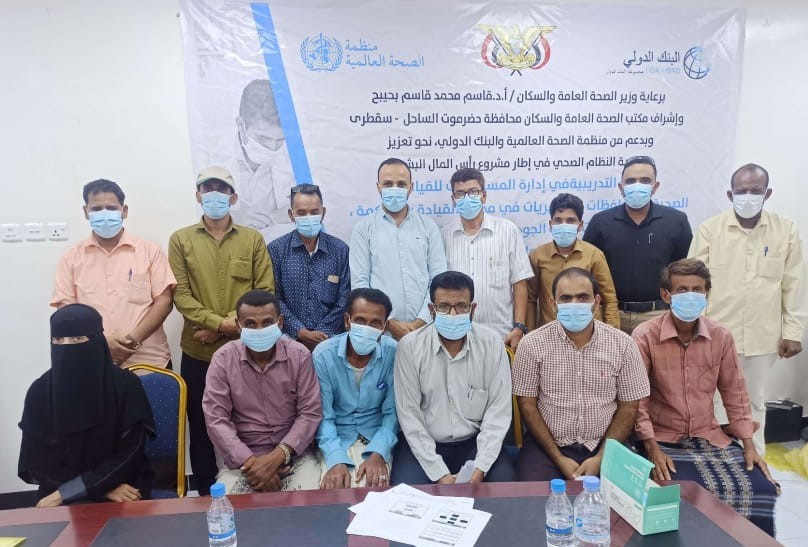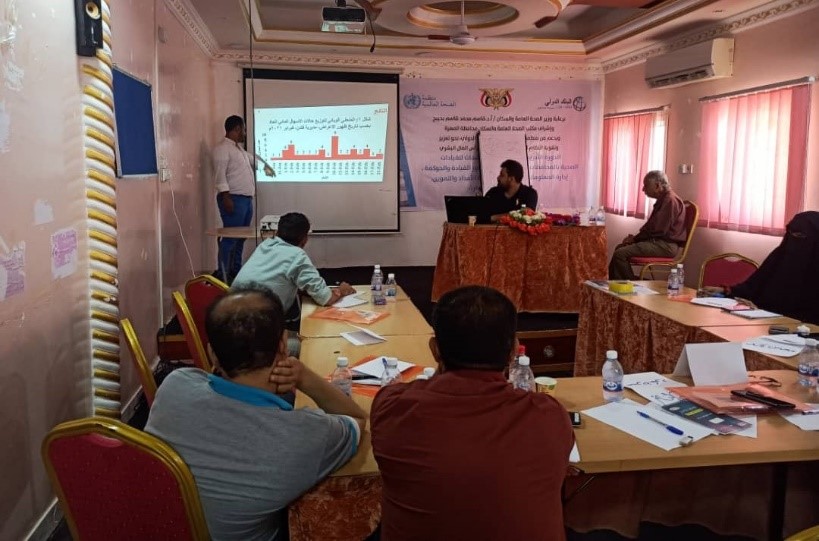
Aden, Sana’a, 31 August 2022 – Quality care in health facilities is key to a high performing health system. To achieve this, managers and senior officials must be equipped with the skills, knowledge and attitude to course correct when there are challenges and lead action for continuous improvements in service delivery.
In 2019, through the Emergency Health and Nutrition Project, with the support of the World Bank, WHO developed the hospital care and management programme for Yemen, to help in addressing major issues in hospital management. A pilot phase initially trained 150 hospital managers and then training was rolled out to 1410 senior health workers.
Now, since March 2022, under the successor project to the Emergency Health and Nutrition Project, the Yemen Emergency Human Capital Project, an additional 430 health workers have participated in the training in the governorates of Al-Mahra, Hadramaut, Marib, Shabwa and Socotra. The programme has now reached all World Bank-supported hospitals in Yemen.
Over 1700 senior health workers have now completed the training from across the 22 governorates of Yemen. The participants include 1380 hospital directors, managers and senior staff, 210 district health managers and 250 governorate health managers.
The training covers 5 essential modules to improve hospital performance: governance, leadership and strategic planning; quality and patient safety; health information management; hospital emergency and disaster management; and supply chain management. Each module runs for 4 days, via a face-to-face workshop. Participants join one or more of the modules, depending on its relevance to their current role in the health sector. All modules are delivered in Arabic, using interactive learning involving lectures, plenary and group discussions, case studies, mini-projects and field visits.
 For quality assurance, WHO directly supervises the training activities in each governorate through several channels, including field presence, direct daily electronic evaluation of trainees, visits by the internal monitoring and evaluation team, and the presence of governorate-level supervisors nominated by the central health authorities. Participant evaluations are reviewed on a daily basis, and training activities are adjusted accordingly, to suit the needs of each group of learners.
For quality assurance, WHO directly supervises the training activities in each governorate through several channels, including field presence, direct daily electronic evaluation of trainees, visits by the internal monitoring and evaluation team, and the presence of governorate-level supervisors nominated by the central health authorities. Participant evaluations are reviewed on a daily basis, and training activities are adjusted accordingly, to suit the needs of each group of learners.
The training materials were prepared by WHO Regional Office for the Eastern Mediterranean, in collaboration with international specialists and academics in the field of hospital care and management, and International Hospital Federation trainers. This programme has also been implemented in Afghanistan, Islamic Republic of Iran and Iraq with WHO support.
In Yemen, there are 48 health care management trainers who lead delivery of the programme. These trainers come from the central authorities, public universities in Aden, Hadramaut and Sana’a, Yemen Council for Medical Specializations, and private institutions such as Balqees College and Al-Razi University.
The WHO country office in Yemen took the lead in translating all the course materials into Arabic and has made the Arabic version available to other interested countries. In November 2021, a review meeting was held with the trainers to check all the Arabic translations and to contextualize materials, practical scenarios, peer learning, and sharing of experiences relevant to the context of Yemen. This helped to enhance the preparedness of the trainers to become well prepared for the rollout of the programme.
Dr Saeelah Awadh, the General Manager for Zungibar Hospital in Abyan Governorate and a participant in health care management, articulated the impact of this training on their day-to-day tasks, saying: “this training is targeting us in the management unit, in terms of how to execute our tasks properly for improving the service provided to the public”.
The ongoing data collection and analysis from the health care management programme show around 97% participant satisfaction with the programme. Almost all participants (98%) recognized the importance of training topics to enhance and strengthen the quality of services provided in their facilities.
Data review also shows managers and senior officials are gaining the skills and knowledge they need to carry out their roles safely and effectively. Preliminary analysis shows a significant improvement between the pre-test (average 32%) and post-test (average 88%) scores. Dr Adham Rashad Ismail Abdel Moneim, WHO Representative to Yemen, reflected: “These initial results indicate that the health care management programme is helping to fill critical gaps in knowledge that will contribute to strengthening hospital performance towards achieving the universal health coverage in Yemen.”
The next steps for the health care management in Yemen will be to launch phase 2 of the programme with development of 2 more modules on human resources management and financial management. This work is starting in the second half of 2022, with the ongoing support of the World Bank via the Yemen Emergency Human Capital Project.




